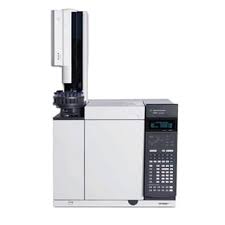Gas Chromatograph
Analysis of liquid products by GC-FID
Agilent 7890B
- DB-5HT: 30 m x 0.250 mm x 0.10 um. Temperature limits: -60 °C to 400 °C
- HP-5MS UI:30 m x 0.250 mm x 0.25 um. Temperature limits: -60 °C to 325 °C (350 °C)

This instrument is installed at the Bioenergy & Biofuels LAB and has been funded by the Autonomous Province of Bolzano in the frame of the development of the NOI Techpark.
Principle of measurament
The sample is injected, by means of a syringe, in a heated pre-column and is volatilized. Depending on chemical and physical properties of the different gaseous components present in the sample and their interaction with the column filling, they flow out of the column at different time. The GC is then equipped with a Flame Ionization Detector (FID), which is used to detect the components of the mixture being eluted off the chromatography columns. This detector pyrolyses the gaseous components by means of an hydrogen stream mixed with an oxidant (i.e. air or oxygen). The positive ions and the electrons produced by the flame are attracted by two collector plates, which are connected to a very sensitive ammeter. The latter detects the ions hitting the plates, then feeds that signal to an amplifier, integrator, and display system.